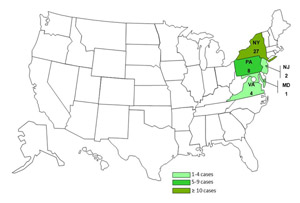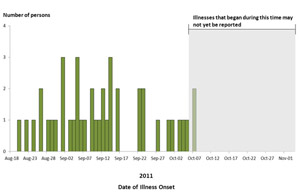Investigation Update: Multistate Outbreak of Human Salmonella Enteritidis Infections Linked to Turkish Pine Nuts
November 3, 2011
On this Page
Today's Highlights
- A total of 42 individuals infected with the outbreak strain of Salmonella Enteritidis have been reported from 5 states.
- Epidemiologic and laboratory investigations conducted by officials in local, state, and federal public health, agriculture, and regulatory agencies linked this outbreak to eating Turkish pine nuts sold in bulk bins at Wegmans grocery stores.
- Consumers should check their homes, including refrigerators and freezers, for Turkish pine nuts purchased from bulk bins at Wegmans stores between July 1, 2011 and October 18, 2011 and not eat them. Consumers should also not eat any foods prepared with the recalled product, including pesto, salads, and baked goods.
Introduction
CDC is collaborating with public health and agriculture officials in New York and other states and the U.S. Food and Drug Administration (FDA) to investigate a multistate outbreak of Salmonella Enteritidis infections linked to Turkish pine nuts purchased from bulk bins at Wegmans grocery stores. Representatives from Wegmans are cooperating with public health officials. Public health investigators are using DNA “fingerprints” of Salmonella bacteria obtained through diagnostic testing with pulsed-field gel electrophoresis, or PFGE, to identify cases of illness that may be part of this outbreak. They are using data from PulseNet, the national subtyping network made up of state and local public health laboratories and federal food regulatory laboratories that performs molecular surveillance of foodborne infections.
A total of 42 individuals infected with the outbreak strain of Salmonella Enteritidis have been reported from 5 states. The number of ill persons identified in each state with the outbreak strain is as follows: Maryland (1), New Jersey (2), New York (27), Pennsylvania (8), and Virginia (4).
Among 42 persons for whom information is available, illnesses began on or after August 20, 2011. Ill persons range in age from <1 to 94 years, and the median age is 43 years old. Sixty percent of patients are female. Two patients were hospitalized. No deaths have been reported.
The outbreak can be visually described with a chart showing the number of people who became ill each day. This chart is called an epi curve. Illnesses that occurred after October 6, 2011, might not be reported yet due to the time it takes between when a person becomes ill and when the illness is reported. This takes an average of 2 to 3 weeks. Please see the Timeline for Reporting of Salmonella Cases for more details.
Investigation of the Outbreak
Epidemiologic and laboratory investigations conducted by officials in local, state, and federal public health, agriculture, and regulatory agencies linked this outbreak to eating Turkish pine nuts sold in bulk bins at Wegmans grocery stores. Some Turkish pine nuts were consumed as an ingredient in prepared foods, such as Caprese salad or asparagus with pine nuts, sold at Wegmans stores. These pine nuts are imported from Turkey.
Among 39 ill persons for whom information is available, 27 (69%) reported consuming Turkish pine nuts or products containing these pine nuts in the week before their illness began.
Early in the investigation, shopper card information was collected and used to identify which specific products to suspect as sources of illness. Ill persons gave permission for public health officials to retrieve shopper card purchase information. A review of shopper card records identified that ill persons had purchased the same type of Turkish pine nuts from bulk bins at different locations of Wegmans grocery stores before becoming ill.
Laboratory testing conducted by public health laboratories in several states has identified the outbreak strain of Salmonella Enteritidis from 5 samples of Turkish pine nuts or pesto containing Turkish pine nuts.
- The Virginia Division of Consolidated Laboratory Services isolated the outbreak strain of Salmonella Enteritidis from Turkish pine nuts that were purchased from bulk bins at Wegmans stores and collected from an ill person’s home, and from retail samples of Turkish pine nuts collected from a Wegmans store where ill persons reported shopping.
- The New York State Department of Health, Wadsworth Center Laboratory, isolated the outbreak strain of Salmonella Enteritidis from two separate samples of homemade pesto containing Turkish pine nuts from two unrelated ill persons' homes, and from Turkish pine nuts which were purchased from bulk bins at a Wegmans store and collected from another ill person’s home.
Salmonella has also been isolated by Wadsworth Center Laboratory and the Pennsylvania Department of Health Bureau of Laboratories from three samples of homemade pesto and three samples of bulk Turkish pine nuts collected from three additional ill persons’ homes; further testing is underway to determine if the Salmonella isolated from these samples match the outbreak strain.
CDC and state and local public health partners are continuing surveillance through PulseNet to identify and interview additional ill persons and to interview ill persons about foods eaten before becoming ill. FDA is working closely with CDC and state officials to investigate the source of the Turkish pine nuts and to determine whether they were distributed to other retailers.
Recall Information
Wegmans Food Markets, Inc. is recalling approximately 5,000 lbs of Turkish Pine Nuts sold in the Bulk Foods department of most Wegmans stores in New York, Pennsylvania, New Jersey, Virginia, and Maryland between July 1 and October 18, 2011.
Clinical Features/Signs and Symptoms
Most persons infected with Salmonella bacteria develop diarrhea, fever, and abdominal cramps 12 to 72 hours after infection. The illness usually lasts 4 to 7 days, and most persons recover without treatment. However, in some persons, the diarrhea may be so severe that the patient needs to be hospitalized. Salmonella infection may spread from the intestines to the bloodstream and then to other body sites and can cause death unless the person is treated promptly with antibiotics. Older adults, infants, and those with impaired immune systems are more likely to have a severe illness from Salmonella infection. More information about Salmonella, and steps people can take to reduce their risk of infection with Salmonella in general, can be found on the CDC Salmonella Web Page and the CDC Vital Signs Web Page.
Advice to Consumers, Retailers, and Others
- Consumers should check their homes, including refrigerators and freezers, for Turkish pine nuts purchased from bulk bins at Wegmans stores between July 1, 2011 and October 18, 2011 and not eat them. Consumers should also not eat any foods prepared with the recalled product, including pesto, salads, and baked goods.
- Restaurants and food service operators should not serve the recalled product.
- Consumers, retailers, and others who have any of the recalled product should dispose of it in a closed plastic bag placed in a sealed trash can. This will prevent people or animals from eating it.
- Persons who think they might have become ill from eating possibly contaminated recalled products should consult their health care providers. Infants, older adults, and persons with impaired immune systems are more likely than others to develop severe illness.
CDC's Role in Food Safety
CDC leads federal efforts to gather data on foodborne illnesses, investigate foodborne outbreaks and monitor the effectiveness of prevention and control efforts. CDC is not a food safety regulatory agency but works closely with the food safety regulatory agencies, in particular, with FDA and U.S. Department of Agriculture’s Food Safety and Inspection Service. CDC also plays a key role in building state and local health department epidemiology, laboratory and environmental health capacity to support foodborne disease surveillance and outbreak response. Notably, CDC data can be used to help document the effectiveness of regulatory interventions.
Previous Updates
Get email updates
To receive email updates about this page, enter your email address:
Contact Us:
- Centers for Disease Control and Prevention
1600 Clifton Rd
Atlanta, GA 30333 - 800-CDC-INFO
(800-232-4636)
TTY: (888) 232-6348 - New Hours of Operation
8am-8pm ET/Monday-Friday
Closed Holidays - cdcinfo@cdc.gov




